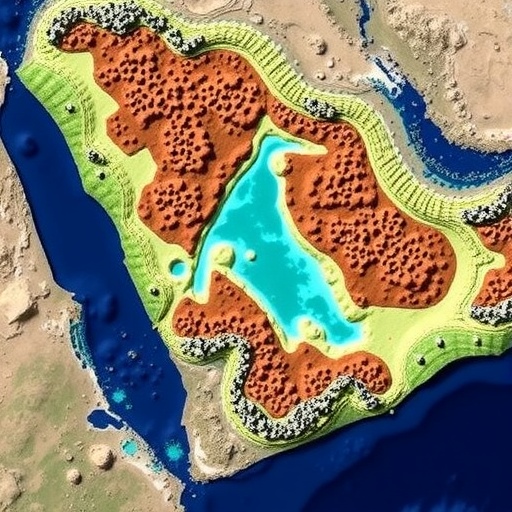In a groundbreaking study published in the journal Coral Reefs, researchers have unveiled an innovative regionalization of coral reefs in the Red Sea, leveraging the power of remotely sensed environmental data. This extensive research identifies two distinct regions that closely correspond with larger climatic trends, significantly reshaping our understanding of coral biodiversity and its response to environmental changes. By using advanced remote sensing technologies, the authors Cerutti, Holzman, and Kiflawi provide vital insights into the spatial dynamics of these ecosystems, prompting a re-evaluation of conservation strategies.
The study meticulously explores the intricate relationship between coral ecosystems and environmental variables, focusing on how these interconnections vary across distinct geographical zones. The researchers utilized sophisticated satellite imagery to collect data on key environmental parameters, including sea surface temperature, salinity, and chlorophyll concentrations, which are critical for understanding the health and distribution of coral reefs. Through this multi-faceted approach, the authors revealed that these two distinct regions exhibit markedly different environmental conditions, influencing the types of coral species that thrive in each area.
Drawing from a plethora of data collected over extended periods, the research demonstrates that one region is characterized by higher temperatures and salinity levels, likely a response to ongoing climate change and anthropogenic impacts. Conversely, the other region shows a more stable environment, providing a sanctuary for various coral species that are more susceptible to stress factors. This duality not only highlights the resilience of certain coral populations but underscores the urgent need to tailor conservation efforts to the specific conditions of each region.
The implications of this research extend beyond academic knowledge; they are crucial for effective policy-making in marine conservation. By delineating these regions, the authors advocate for targeted intervention strategies that are essential for the preservation of coral reefs, which are among the most biodiverse ecosystems on the planet. The study calls attention to the urgency of adapting conservation methods to align with the ongoing changes in environmental conditions, emphasizing the importance of understanding local climatic forcing mechanisms that affect coral health.
Moreover, the findings serve as a clarion call to the global scientific community regarding the dire state of coral reefs. As climate change accelerates, the disparities between these two regions may become more pronounced, leading to uneven impacts on coral health and biodiversity. Consequently, the researchers urge for immediate action, encouraging further studies and a more profound commitment from policymakers to mitigate risks associated with rising ocean temperatures and other climate-related stresses.
One of the study’s critical contributions lies in its methodological framework, which integrates remote sensing with ecological modeling. This innovative approach provides a more comprehensive understanding of the intricate interactions between marine ecosystems and their environments than traditional survey methods alone. By marrying technology with ecological science, the researchers set a precedent for future investigations that aim to explore similar ecological phenomena in other vulnerable marine environments.
Additionally, the paper addresses how human activities, including coastal development and overfishing, further exacerbate the pressures on coral reefs. The authors emphasize that localized stressors must be accounted for alongside large-scale climatic changes to foster a holistic approach to coral reef conservation. By incorporating socioeconomic factors into their research, the authors advocate for a greater synergy between ecological protection and community engagement, ensuring that conservation measures are not only scientifically sound but also socially equitable.
As the world grapples with increasing environmental uncertainty, the study contributes significantly to coral reef science by emphasizing the need for adaptability in research and conservation strategies. The researchers posit that ongoing monitoring and data collection will be vital for understanding future shifts in coral communities as they respond to both natural and anthropogenic pressures. Furthermore, they highlight the importance of generating awareness among local communities about the value of these ecosystems, thereby fostering stewardship that complements scientific efforts.
Complementing the ecological findings, the study also outlines several avenues for future research. Areas ripe for exploration include the metabolic responses of different coral species to varied temperature regimes and the implications of algae-coral symbiosis in the face of climate fluctuations. By shedding light on these critical areas, the researchers underscore the complexity of coral reef biology and the necessity for continued investigation into the subtleties of coral responses in dynamic environments.
In conclusion, the regionalization of Red Sea coral reefs based on remote sensing offers a paradigm shift in understanding how climatic forces shape coral ecosystems. The authors’ compelling findings underscore the importance of utilizing advanced technologies to inform conservation efforts and highlight the urgent need for collaborative action to mitigate the impacts of climate change. As coral reefs continue to face unprecedented stress, the insights presented in this study provide a foundational step forward in safeguarding these irreplaceable ecosystems.
The research not only charts a path for future scientific endeavors but also empowers stakeholders and policymakers with the knowledge needed to implement effective conservation strategies. In light of this work, it is clear that immediate and sustained efforts are essential to secure the future of coral reefs, one of Earth’s most vital ecosystems.
In summary, the study by Cerutti et al. not only enriches scientific literature but serves as a crucial reminder of our collective responsibility to protect vulnerable marine environments. With the challenges ahead, it becomes even more critical that we leverage knowledge, technology, and community participation to ensure the resilience of coral reefs and their associated biodiversity for generations to come.
Subject of Research: Coral reefs regionalization based on remotely sensed environmental data
Article Title: Regionalisation of Red Sea coral reefs based on remotely sensed environmental data identifies two distinct regions that align with large-scale climatic forcings.
Article References:
Cerutti, J.M.B., Holzman, R., Kiflawi, M. et al. Regionalisation of Red Sea coral reefs based on remotely sensed environmental data identifies two distinct regions that align with large-scale climatic forcings.
Coral Reefs 44, 1127–1142 (2025). https://doi.org/10.1007/s00338-025-02668-z
Image Credits: AI Generated
DOI: https://doi.org/10.1007/s00338-025-02668-z
Keywords: Coral reefs, Red Sea, remote sensing, climate change, biodiversity conservation, ecological modeling.




